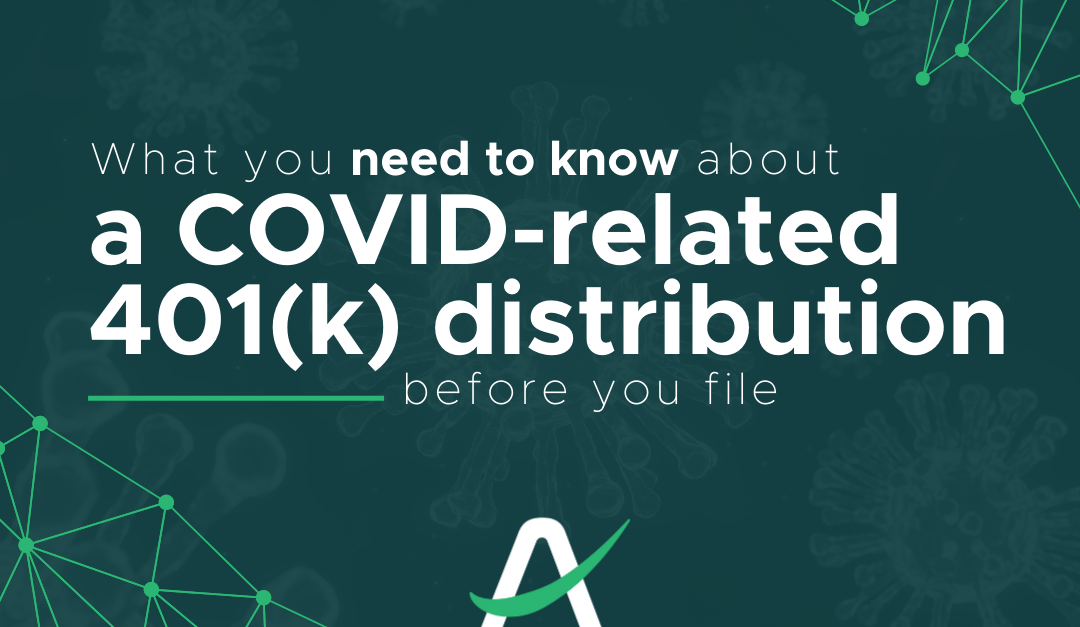As part of the Coronavirus Aid, Relief, and Economic Security Act (CARES Act), enacted on March 27, 2020, Section 2202 allowed the option for special distributions to be made to those personally impacted by COVID-19. Although according to retirement plan providers such as Fidelity and Vanguard most people did not take the early distribution of up to $100,000, the administration recently issued updates that clarified and reiterated details related to the disbursement rules designed to help individuals and entrepreneurs impacted by the virus.
What are the special rules for retirement plans in section 2202 of the recent CARES Act?
In general, section 2202 of the CARES Act provides for expanded distribution options and favorable tax treatment for up to $100,000 of coronavirus-related distributions from eligible retirement plans (certain employer retirement plans, such as section 401(k) and 403(b) plans, and IRAs) to qualified individuals, as well as special rollover rules with respect to such distributions. It also increases the limit on the amount a qualified individual may borrow from an eligible retirement plan (not including an IRA) and permits a plan sponsor to provide qualified individuals up to an additional year to repay their plan loans.
What qualifies?
According to the IRS, individuals qualify for section 2202 of the CARES Act if:
- They are diagnosed with COVID-19 by a test approved by the Centers for Disease Control and Prevention
- Their spouse or dependent is diagnosed with COVID-19 by a test approved by the Centers for Disease Control and Prevention
- They experience adverse financial consequences as a result of being quarantined, being furloughed or laid off, or having work hours reduced due to COVID-19
- They experience adverse financial consequences as a result of being unable to work due to lack of child care due to COVID-19
- They experience adverse financial consequences as a result of closing or reducing hours of an owned or operated business due to COVID-19
What are the taxes and fees?
Anyone receiving a coronavirus-related distribution will not have to pay the 10% additional tax on early distributions, however, they will have to report the disbursement as income, and pay all income-related taxes within three years. This may be divided into three payments or paid all at once. If filed incorrectly, individuals taking advantage of Section 2202 may be responsible for significant penalties due to incorrect filings of income.
Is there a way to avoid paying federal and state income taxes on the amount?
Not unless you pay it back within three years. If you complete the repayment within three years after the date that the coronavirus-related distribution was received, the distribution will be treated as though it were repaid in a direct trustee-to-trustee transfer so that you do not owe federal income tax on the distribution.
If, for example, you receive a coronavirus-related distribution in 2020, you choose to include the distribution amount in income over a 3-year period (2020, 2021, and 2022), and you choose to repay the full amount to an eligible retirement plan in 2022, you may file amended federal income tax returns for 2020 and 2021 to claim a refund of the tax attributable to the amount of the distribution that you included in income for those years, and you will not be required to include any amount in income in 2022. (IRS payment example)
Pro Tip: A ROBS Plan might best serve your needs
As you evaluate options for business funding, it’s important for you to look at what is best for your individual situation. If you are looking for funds to purchase or invest in a business, doing a Rollover as Business Start-Ups (ROBS) plan might be a good resource for you. In this type of transaction, funds from eligible retirement accounts, including a 401(k) or a traditional Individual Retirement Account (IRA), are rolled over into a new account, which has a C corporation structured around it to invest in your business. This allows for your 401(k) to essentially act as an investor and shareholder in your business with you. It shares the losses and gains, and does not have to be paid back with all of the taxes and fees that you will see below in the updates for distributions made to 401(k) borrowers under 59 years of age.
For more information on how a ROBS plan might assist your business goals, contact the Accelefund team at (913) 274-1930 or through our website at https://accelefund.com/.

